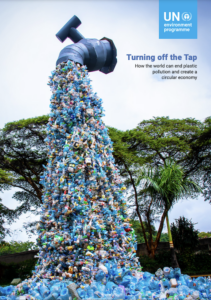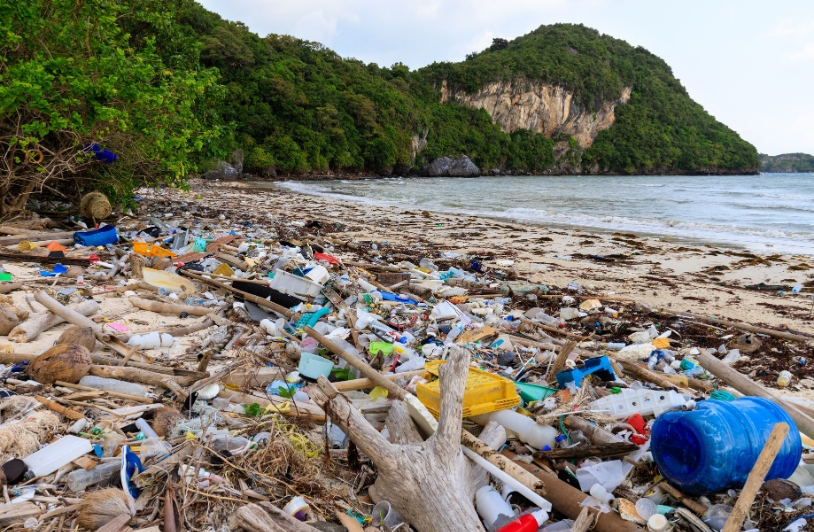Report and Upcoming Treaty Talks Accused to Be Excluding Key Voices
The United Nations Environment Programme (UNEP) published a new report this week, Turning off the Tap: How the world can end plastic pollution and create a circular economy, which provides a plan of action that they say will reduce plastic pollution by 80% by 2040.
The report seeks to provide a better understanding of the magnitude and nature of the changes required in the plastics economy in order to achieve the desired reduction.
“The way we produce, use, and dispose of plastics is polluting ecosystems, creating risks for human health and destabilizing the climate,” said UNEP Executive Director, Inger Andersen, in an official statement. “This UNEP report lays out a roadmap to dramatically reduce these risks through adopting a circular approach that keeps plastics out of ecosystems, out of our bodies, and in the economy.”

The report calls for governments and companies to implement policy and market shifts, using existing technologies. It offers a key focus on an overall reduction on the use of plastics by implementing circularity, while also proposing the following three shifts:
- Reuse – transformation of the ‘throwaway economy’ to a ‘reuse society’ where reusing plastic products makes more economic sense than throwing them away.
- Recycle – accelerating the market for plastic recycling by ensuring that recycling becomes a more profitable venture.
- Reorient and Diversify – shifting the market towards sustainable plastic alternatives, which will require a shift in consumer demand, regulatory frameworks and costs.
If successful, UNEP asserts that the plan could save the global economy as much as $5.5 trillion ($1.27T when considering costs and recycling revenues; and $3.25T by avoiding externalities, such as expenses related to healthcare, remediation, climate, air pollution, litigation and expenses), while creating over 700,000 jobs in mostly low-income countries.
“On the surface, I’m thrilled to see the global community focusing on solving plastic pollution,” said Dr. Charlie Rolsky, Senior Research Scientist at the Shaw Institute, in Blue Hill, Maine, and also one of the world’s leading researchers on microplastics. “It’s something many of us have been working towards for well over a decade, so seeing it coming to fruition is exciting, but something we must also take with some caution, due to some of the short comings that critics have revealed.”
Criticisms
The report has been applauded by many, including as a lead-in to the second round of UN negotiations on a legally binding treaty to end plastic pollution (INC-2), but it has also been met with some criticism. Those include:
- Systemiq as a co-author on the report. Some have called into question their impartiality due to the fact that many of their clients are from the industry sector.
- The exclusion of input from the Scientists’ Coalition for an Effective Plastics Treaty, which is a group representing over 200 scientists worldwide. Despite offering over 300 comments on the report, their input was ignored, while that from the likes of Unilever and other corporate entities was considered. UNEP has since made a statement saying that this was due to a technical issue.
- The suggestion of using questionable recycling and disposal methods, such as chemical recycling and kiln burning of plastics. UNEP has since clarified their position, stating that only safe disposal facilities are to be used as a last resort to avoid plastic leaking into the environment. They also stressed the need for emissions control and standards to assure safety.
- The report does not fully address the true cost of the health and environmental effects of plastic pollution.
INC-2
These criticisms come at the same time that UNEP is facing accusations of exclusion at the upcoming plastics treaty negotiations. Scientists and NGOs have said that those most needed to be heard from – those directly harmed by dumping and burning plastic waste, as well as waste pickers that are so crucial to recycling systems – are being kept from fully participating due to last-second restrictions on the number of NGOs that will be allowed to attend.
“Plastic pollution and waste in general is unevenly affecting people and ecosystems in the global south,” said Mark Minneboo, Director of Advocacy for Plastic Oceans International. “The inclusion of representatives who can best voice the challenges there and who can explain specific local gaps and barriers, the ones who work on a community level, can only be achieved by active participation from them in these INC meetings. The exclusion of scientific voices in the UNEP report is in step with this same belief.”
Minneboo says that his organization, and many others, were taken by surprise when restrictions were announced that greatly limit the participation of civil society. He says that for those organizations that have been invited, only one access badge per organization will be handed out, after initially approving a maximum of 5 delegates per organization. He also points out that this is the opposite of what was stated in resolution 5/14: “The United Nations Environment Assembly, stresses the need to ensure the widest and most effective participation possible in the work of the ad hoc open-ended working group and of the intergovernmental negotiating committee.”
“We are worried that these community specific issues will not be sufficiently addressed during the negotiations,” said Minneboo. “Especially regarding the effective implementation of national legislation to end plastic pollution, as it faces many local barriers that can best be voiced by the people who experience them on a daily bases.”
Critics hope that new voices from science and civil society will be heard, but time is of the essence for that to happen, as INC-2 takes place May 29 to June 2, in Paris, France.





